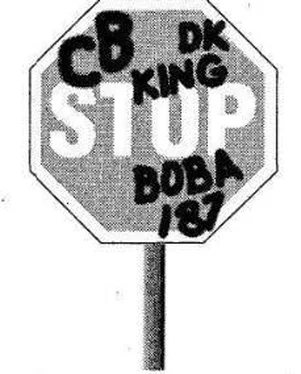Until now.
Ben saw Leeman mime picking up a golf club and swinging it down onto Maria’s head. The club apparently broke upon impact. Leeman picked up the broken shaft and rammed it through Maria’s neck.
His face still transfixed with rage, Leeman withdrew slowly, wiping his hands and face. He looked all around, then bolted away.
When he reached the far wall, he stopped. The reenactment was over. Leeman closed his eyes and, like some primitive Method actor, stepped out of character.
Leeman returned to his chair. Everyone else in the room was staring at him with blank faces, with wide eyes. It was a long time before anyone spoke.
Finally the DA said, “I don’t believe any more questions will be necessary. Thank you for your time.” He stepped out of the room and closed the door behind him.
Twenty minutes later Leeman Hayes was charged with murder in the first degree.
After Ben had watched the tape three times, he became convinced that Leeman’s case was hopeless. He saw no opening, or ambiguity, or anything else he could use to convince a jury this was anything other than what it appeared to be—a pantomimic confession of guilt.
Ben hit the rewind button and watched Leeman run through the performance backward. Giselle jumped back into his lap. Sweet kitty—and no dead bird in her mouth, he was relieved to see. He stroked the back of her neck. She purred and looked up at him, peering intently with those big green cat eyes
Wait a minute. Ben grabbed the remote and stopped the tape just as Leeman was beginning his performance.
It was so quick he almost missed it. In fact, he had missed it during each previous viewing. Leeman did not move directly from unresponsiveness to the performance. First, in a gesture that took less than a second, he held his right hand over his eyes, as if shading off an imaginary sun.
See.
It was the same gesture he had used to tell Ben he had seen him getting out of his Honda. There were no words attached—Leeman was still preverbal—but the gesture was absolutely the same.
See.
Leeman wasn’t telling the police officers what he did. He was telling them what he saw.
See.
It wasn’t a confession. It was an eyewitness account. Ben was certain of it.
But how would he convince a jury? Regardless of what he told them, Ben knew most jurors, most anybody, would view that taped performance as a confession. Ben’s explanation about the gesture would be written off as a desperate ploy by a desperate defense attorney.
And Leeman Hayes would be convicted of a crime he didn’t commit. And sentenced. In addition to the ten years of institutionalization to which he had already been condemned, even though he had never been convicted of a crime, he would spend the rest of his life a prisoner.
Or he would be sentenced to death.
It would be hard to say which penalty would be worse for Leeman.
Ben pushed the stop button on the remote. He couldn’t let that happen. Could he?
Are you going to spend the rest of your life representing every petty felon and hard-luck story that slithers into your office?
The words thundered in Ben’s brain. He would never be able to convince the jury Leeman’s taped performance wasn’t a confession, and Leeman himself would be absolutely worthless at trial. The file had virtually no exculpatory evidence in Leeman’s favor. Ben would have to start his investigation from scratch. He would have to unearth witnesses and evidence on a ten-year-old crime.
An extremely difficult task.
Difficult? Try impossible.
Don’t be such a sucker.
One thing was certain. If Ben took this case, he could kiss goodbye any chance of regaining Jack Bullock’s respect.
I’m so disappointed, Ben. You were like a son to me.
But other images from the day flashed through Ben’s mind. Leeman’s face on the videotape—scared, helpless, alone. Leeman Hayes ten years later—bloated, locked away in dirty, ill-fitting clothes, his whole life passing him by. The eager, desperate look in Ernie Hayes’s eyes. What was it he had said? I knew you were the one who was finally going to help my boy.
I knew it.
At least one thing Ernie had said was true. If Ben didn’t take the case, who would?
Ten years. Ten long years.
Ben turned off the television. His deliberation was over. Despite all the dangers, all the difficulties, and all common sense, he was representing Leeman Hayes.
He had no choice.
They didn’t have much of a chance. But that was better than no chance at all. That was better than condemning Leeman to more wasted days. More isolation and fear. And suffering.
Even more than he had already suffered.
At the hands of justice.
TWO
Tales of Two Cities
15
“BUT YOU PROMISED!”
“I did nothing of the sort.”
“Did so. You said you’d come home early and we’d go to the ball game.”
“I said I would try. That’s all.”
“I shoulda known better. You never wanna do anything with me. You hate me.”
“I do not. Now listen to me, son.”
The man in the red wig listened carefully to Abie and his father’s argument. Nice of them to squabble on the front porch. He was safely tucked away behind the eight-foot-high hedge surrounding the Rutherford estate, but he could hear every word. He could see them, too, but they would never notice him. The estates were spaced so generously that none of the neighbors were likely to see him either.
“Listen to me, son,” Rutherford continued. He was much fairer than his son; it heightened the contrast between them. Family relations in chiaroscuro. “Your father has many important business affairs that have to be managed. I wish I could spend all day playing with you, but I can’t.”
Abie folded his arms across his chest. “You could if you wanted to.”
Rutherford’s lips tightened. “Abie, sometimes I have to work. Look around you. Look at this house. Look at those cars in the garage. Not everybody lives like you do. Who do you think paid for that? Where do you think all that money came from?”
“Mommy says you got it all from your daddy.”
“That’s—beside the point. Someone has to manage the money. Protect our investments. That’s what your daddy does—”
“Mommy says you spend all day at that stupid country club.”
“Your mother—” He muttered something under his breath. “That isn’t true, and it isn’t—”
Abie pushed away. “You play all the time. You just don’t wanna play with me!”
“Abie. Abie! ” Rutherford reached for his son, but Abie slipped out of his grasp. “I go to the country club to maintain business relationships. Those club members are my partners. They’re movers and shakers. Some of the wealthiest men in the state. I know you’re only ten, but try to understand.”
“I understand. You’d rather swing a stupid golf club than take me to a baseball game.”
The man in the red wig grinned. The dysfunctional family was a beautiful thing, at least from his point of view. If it weren’t for fathers who couldn’t find time for their sons, or who treated their sons badly when they were around, he’d never find an opening. But rich, pompous asses like Rutherford made his job almost too easy.
“Look, son.” Rutherford’s face was flushed with exasperation. “I have some meetings tomorrow, but … what time is the game?”
“Two o’clock. Like always.”
“All right. Let me see what I can do. …”
“Is that a promise?”
Rutherford laid his hands on his son’s shoulders. “All right, then. It’s a promise.”
Читать дальше







